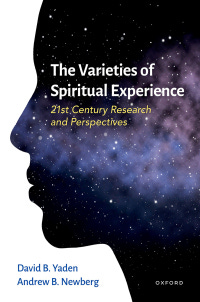The Varieties of Spiritual Experiences
Learning to recognize and appreciate the diversity in human nature
Welcome back!
Spiritual experiences come in many forms and can be deeply personal and transformative. In this blog post, we'll explore the various types of spiritual experiences, drawing from the research by Yaden et al. (2017; The Varieties of Self-Transcendent Experiences) and Yaden & Newberg (2022; The Varieties of Spiritual Experiences). Each of the following experiences have self-transcendent characteristics, meaning they experience an expanded sense of awareness or connection beyond the typical boundaries of the self. Understanding these experiences can help you recognize and appreciate the diverse ways spirituality can manifest in your life and in the lives of others.
Anecdotes from The Varieties of Spiritual Experiences: 21st Century Research and Perspectives
The idea that there are varieties of experience is important for several reasons. First, it is misleading to think that everyone who has had a spiritual experience is describing the same experience. There are both elements of experience that vary between individuals, yet there may be certain elements that are common among some or all types of spiritual experiences.
What are the qualities of a spiritual experience?
First, spiritual experiences are mental states. This means that spiritual experiences involve a “dramatic shift in one’s perceptions, emotions, and cognitions - what is sometimes called an ‘altered state of consciousness’”. Therefore, merely thinking about religious content alone would not be considered a spiritual experience.
Second, spiritual experiences are not merely emotions. Emotions may be involved and can come out of such experiences, but self-transcendent emotions are not, by themselves, spiritual experiences.
Third, spiritual experiences include some content having to do with some aspect of reality beyond appearance. That is, one feels as if he or she has contacted something deeper than everyday life, or to an “unseen reality”.
“The unseen aspect is what allows people to have a spiritual experience around other people, and yet other people do not perceive the same thing that the experiencer is perceiving. The reality aspect requires that some underlying, often essence-like component of existence is perceived. Most often, this involves some kind of mind --a god, gods, or other supernatural entities-- but it can also involve a perception of an underlying oneness or even beauty in existence.” (Yaden & Newberg, 2022)
What are the varieties of spiritual experiences?
Now that you know a little more (than you probably wanted to - lol) about spiritual experiences, I’d like to draw your attention to the breadth of experiences that can fall under the umbrella of spiritual experiences. These experiences vary in how much arousal or transcendence or divinity is experienced, however, this landscape will hopefully allow you to relate some of your personal experiences to a greater system of meaning.
1. Mindfulness
Mindfulness refers to a state of being fully present and aware of your thoughts, feelings, and surroundings without judgment (Kabat-Zinn, 1994). This practice often involves meditation or other focused activities to cultivate a non-judgmental awareness of the present moment. Research has shown that mindfulness can improve well-being, reduce stress, and enhance self-awareness (Brown & Ryan, 2003). This mild experience of transcendence is one common stepping stone to uncovering the unity and beauty in the world.
2. Flow
Flow is a state of total immersion in an activity, where you become so absorbed in what you're doing that you lose track of time and self-consciousness (Csikszentmihalyi, 1990). This experience often occurs when you're engaged in a challenging but enjoyable task, such as playing a musical instrument or participating in a sport. Flow is associated with increased creativity, productivity, and overall happiness (Csikszentmihalyi, 1997). This mild experience of transcendence often accompanies other spiritual experiences, such as mystical experiences, as flow can lead to feelings of unity with an underlying reality and a sense of timelessness.
3. Peak Experiences
Coined by psychologist Abraham Maslow, peak experiences are moments of intense joy, wonder, and awe that leave a lasting impact on a person's life (Maslow, 1964). These experiences can lead to a sense of unity with the world, feelings of transcendence, and increased self-awareness. Peak experiences can occur spontaneously or be cultivated through activities like meditation, prayer, or engaging with nature.
4. Mystical Experiences
Mystical-type experiences involve a direct encounter with the divine or a profound sense of unity with the universe (Hood, 2001). These experiences often involve feelings of timelessness, ineffability (inability to describe the experience in words), and a deep sense of peace and interconnectedness. Mystical experiences can occur in various religious and spiritual contexts and are often considered transformative and life-changing.
Fun fact: these are my favorite experiences to study!
5. Self-Transcendent Positive Emotions (Love, Awe, Gratitude, Hope)
Spiritual experiences can also be connected to specific positive emotions. Love, for example, can lead to feelings of unity and compassion for others (Fredrickson, 2013). Awe, often experienced in response to vast or overwhelming stimuli like natural wonders, can foster a sense of humility and interconnectedness (Keltner & Haidt, 2003). Gratitude promotes appreciation for the positive aspects of life and can be a powerful force for well-being (Emmons et al., 2003). Lastly, hope can inspire a sense of purpose and resilience in the face of adversity (Snyder, 2002). Each of these emotions facilitates connection with others, a core aspect of spirituality.
6. Numinous Experiences
Numinous experiences, a term coined by Rudolf Otto, refer to encounters with the sacred or divine that inspire feelings of awe, fascination, and humility (Otto, 1950). These experiences can be both deeply moving and somewhat unsettling, as they confront us with the mystery and power of the transcendent elements of our world (and beyond).
7. Synchronicity ("Everything Happens for a Reason") Experiences
Synchronicity experiences, introduced by psychologist Carl Jung, involve the perception of meaningful coincidences or connections between seemingly unrelated events (Jung, 1952). These experiences can foster a sense of wonder and a belief that everything happens for a reason, reinforcing the notion that the universe operates in a purposeful and interconnected way.
Fun fact: I hear about this one the most and I think many people endorse this belief, whether or not they think about it in terms of spirituality.
8. Revelatory Experiences
Revelatory experiences involve receiving profound insights or truths, often in the form of visions, dreams, or sudden realizations. These experiences can be transformative, leading to a deeper understanding of oneself, others, or the nature of reality. They might occur during meditation, prayer, or moments of deep contemplation, providing guidance or clarity on life's challenges or dilemmas. I like to think of this as deep or “divine” insight.
Where do we go from here?
In conclusion, the variety of spiritual experiences is vast, ranging from mindfulness and flow to peak and mystical-type experiences. They can also encompass specific positive emotions like love, awe, gratitude, and hope, as well as more mysterious encounters like numinous, revelatory, and synchronicity experiences. Each type of experience is unique, and they can interact with and complement one another, contributing to a rich and multifaceted spiritual journey.
Key Takeaways:
Spirituality is about your personal connection to the sacred or divine, while religion can refer to both institutional and personal beliefs, values, practices, and experiences.
Spiritual experiences come in many forms, such as mindfulness, flow, peak experiences, mystical experiences, self-transcendent positive emotions, numinous experiences, synchronicity experiences, and revelatory experiences.
Understanding and exploring these diverse spiritual experiences can contribute to personal growth, a sense of connection, and a deeper understanding of oneself and the world.
Questions to Spark Further Thought:
Have you ever experienced any of the spiritual experiences mentioned in this post? If so, which ones resonated with you the most?
How might exploring different types of spiritual experiences enrich your understanding of yourself and your connection to the world around you?
Are there any spiritual practices or experiences you'd like to learn more about or incorporate into your daily life? Why do they interest you?
Remember, spirituality is a personal journey, and it's up to you to discover and explore what resonates with you. Don't be afraid to ask questions, seek guidance, and be open to new experiences as you embark on your own path of spiritual growth. Thank you for reading!




